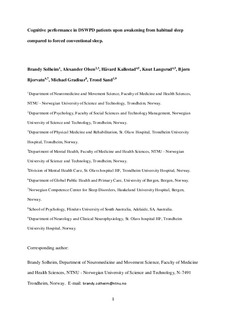| dc.description.abstract | Difficult early morning awakening is one of the defining symptoms of delayed sleep–wake phase disorder. It is accompanied by low cognitive arousal and drowsiness resulting in difficulty concentrating and focusing attention upon awakening. We designed the current study to quantitate cognitive performance (i.e. omissions, commissions, reaction time [average and variability]) and cognitive domains (i.e. focused attention, sustained attention, impulsivity and vigilance) with Conners’ Continuous Performance Test II during both habitual and conventional (00:00–07:00 hr) sleep–wake schedule in young adult patients with delayed sleep–wake phase disorder (n = 20, mean age = 24.8 years, SD = 3.0) and controls (n = 16, mean age = 24.4 years, SD = 3.4). Conners’ Continuous Performance Test II was administered after awakening and in the afternoon during both habitual and conventional conditions. In‐laboratory polysomnography was performed for 2 nights. We assessed sleep, tiredness, chronotype and depression using questionnaires. Saliva was sampled for dim light melatonin onset measurements. Repeated‐measures ANOVAs were applied for the Conners’ Continuous Performance Test II measures with group (patient/control), time (afternoon/morning) and condition (habitual/conventional schedule) as fixed factors. Patients with delayed sleep–wake phase disorder had reduced reaction times, especially in the morning, greater response speed variability, and made more omission and commission errors compared with controls. Patients with delayed sleep–wake phase disorder also had reduced focused attention, especially upon forced early awakening. The short total sleep time of patients with delayed sleep–wake phase disorder could not statistically explain this outcome. In conclusion, we observed a state‐dependent reduced ability to focus attention upon early morning awakening in patients with delayed sleep–wake phase disorder. Patients also had more omissions, longer reaction time and increased RT variability after habitual sleep, suggesting a possible small cognitive trait dysfunction in delayed sleep–wake phase disorder. | nb_NO |
